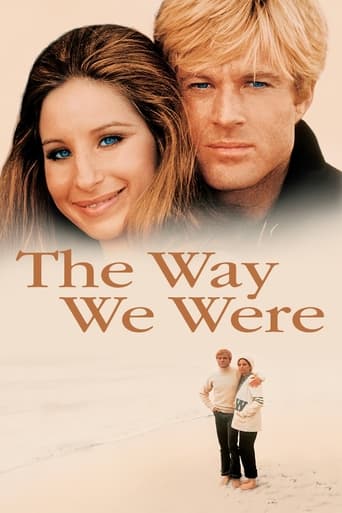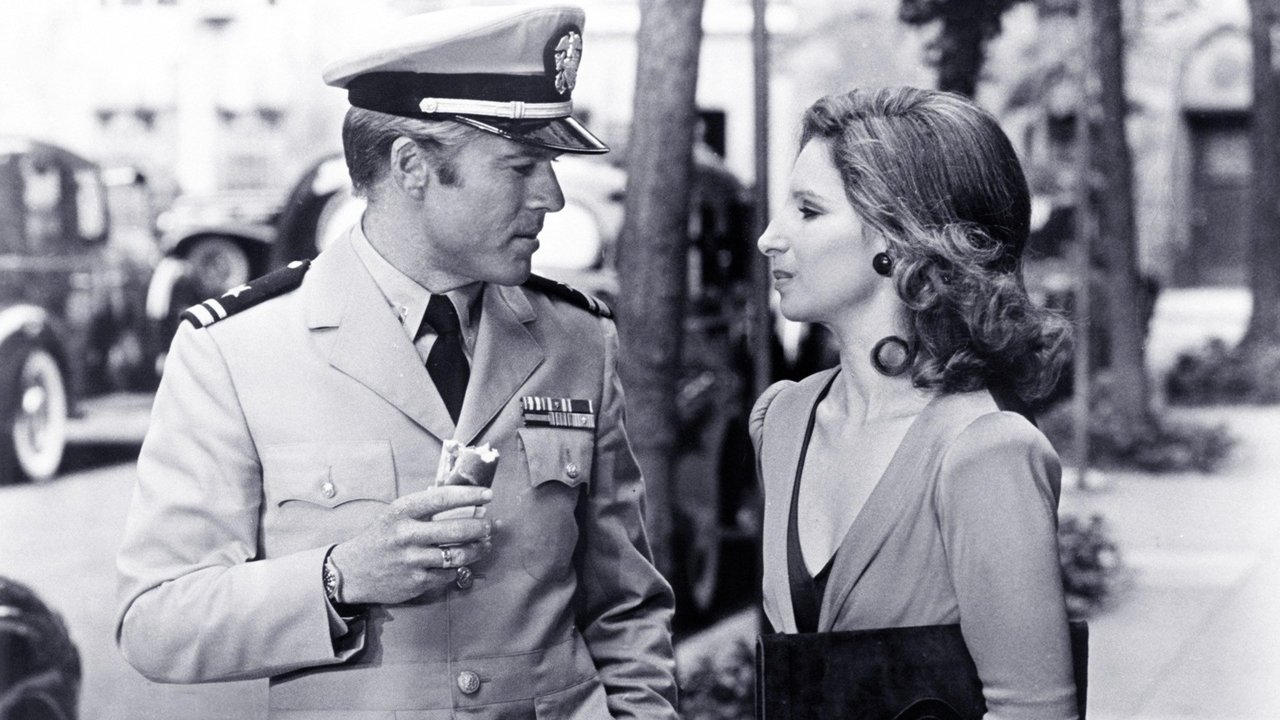leethomas-11621
One of the screen's greatest romantic films. But it could have been a whole lot better. The scenes with Streisand and Redford together are lovely. Best when there is a tinge of wistful nostalgia and sadness in the plot. Unusual to have an intelligent romance in a film, as well as literary characters. But the political narrative is not handled well and becomes muddled. Maybe that and the Hollywood part of the plot could have been better directed.
Beautiful score and title song won Oscars. Laurents could have won one for the screenplay too if it had been treated differently.
Streisand and Redford are perfectly cast and are at their best.
I love how marriage and divorce are never mentioned specifically. We never see the child and Hubbell's new wife (whose name we are not told) is all but invisible in her scene. I suppose this is to keep the plot as true as possible to its origin as a gay love story (before same sex marriage and adoption rights were legal).
adonis98-743-186503
Two desperate people have a wonderful romance, but their political views and convictions drive them apart. The Way We Were (1973) is one of those Romantic Dramas that are really not my kind of film. The duet of Streisand and Redford is cute but not cute enough to hold the entire movie together in my opinion. Plus the pacing and the film feels like it's dragged a lot and it doesn't have an actual clear ending also some jokes or the humor that the movie tries to do just doesn't succeed as much as it could. Overall if you're a die hard of the director or this kind of filmmaking you might actually enjoy this but if you're not? Maybe watch a better movie starring any of this actors. (5/10)
Davalon-Davalon
I was relatively young when this film first came out. I, like many others, thought it was great, and loved Streisand and Redford and the theme song. I recently saw TWWW again, nearly 40 years later, and my opinion has changed dramatically. I cannot deny that Redford and Streisand definitely seem to have some kind of chemistry. And, as I felt the first time, Barbra represented every ugly duckling, gay or straight, who somehow manages to capture the prize. Via Barbra's performance, we can easily imagine what it must have been like to lie down with a prince. This, I think, may be one reason why the film had a certain level of success. Barbra also had moments where she "spoke the truth" with passion and intensity. I think people related to this outspokenness, this gutsiness, this willingness to take chances and not apologize for one's opinions. Barbra was also the "outsider" -- she was the smart Jewish girl who knew she had to work harder, study more, and fight for what she wanted, because nothing would come to her easily. It is for these reasons why I think the movie resonated. But the reality is: The movie is not about anything, not really. What, exactly, is the plot? They meet in school, they meet years later, they fall in love, they get married, he has an affair, they divorce, they meet again... okay, so what? Barbra, who does have tons of talent, but in this film looked like she was performing her graduate project for Acting 101, spends a lot of time arguing and getting upset about things. But whatever those things are seem to be only tangentially connected/related to the rest of the story (if you can call it that). Bob, yes, stunning to look at, coasts through the film with little to do or say. He didn't want to do the film, and I can see why. Yeah, he looks great, but what is the emotional arc of his character? A lot was cut from this film and as a result, it seems disjointed. There is an inordinate amount of time spent on Bob's career as a screenwriter in Hollywood while a pregnant Barbra tends to their little beach house. And yet everyone seems miserable and unhappy. Voices were raised, but nothing really happens. Near the end when Barbra has apparently given birth to their child (after it's clear that their relationship is over), Bob shows up at the hospital. Barbra is perfectly coiffed and made-up as if she's just come back from a spa. He stands there, emotionless, ready to abandon her and their newborn child. We're supposed to like him? I couldn't stand him. In fact, James Wood, who we meet early on in the film, who seems to be Barbra's quasi-boyfriend in college and who seems to support everything she was trying to do, is clearly a better man for her--but he wasn't as handsome. Life is cruel, isn't it? Finally, the theme song: Yes, it is a beautiful song for what it is and Barbra sings it beautifully. Who knew that it would become an iconic song and help define her career? She didn't even want to sing the song--she felt it was too simple. She had to be talked into it. So, finally, in the end, what are we left with? A unique opportunity to see Barbra and Bob dressing in period costumes, lots of bad, bad lighting, a plot-less rambling "story" that does not stay any one place long enough for us to care about much of anything, lots of intense arguing and challenging others from Barbra, and lots of stoic looks from Bob. And yet, it was a big hit. Like I said at the beginning, it was Barbra's "ugly duckling" status and "landing the prince" that I think resonated with a large part of the audience. At least it did with me... back then. At this point in time, I just kind of stared at it in amazement and said, "What exactly is this all about?"
ElMaruecan82
At the dawn of the campus years, Hubbell Gardiner (Robert Redford) celebrates the first publication of one of his short stories; and Katie Morosky (Barbra Streisand) raises a toast "to his first novel". Meanwhile, he asks her why she didn't take with humor one joke made after a political speech, all she needed was to laugh at a rather benign prank and she would have won the audience. But Katie has no sense of humor whatsoever when it comes to politics and Gardiner hardly believes he can make it as a novelist. Here we are with flawed characters trying to inculcate the very value that lacks in the other: detachment and passion. And that kind of complementarity is the true basis of a realistic romance rather than a simple love at first sight or a hate-then-love formula, "The Way We Were", directed by Sidney Pollack in 1973, is above all these clichés.The scene I just described encapsulates the whole relationship between the Jewish, passionate and activist Katie Morosky and the classy, WASP and handsome Hubbell Gardiner. She believes in his talent, he's amazed by her passion, she's a burning fire that ignited his heart, and he embodies a sort of perfection only her eyes can value and cherish, and the way she tenderly caresses his hair is more eloquent than any description. The acting from the two leads makes the chemistry so real, so believable, that I even failed to see how the couple could be seen as 'unlikely', although the attraction between opposites is what drives the whole narrative, if not the romance. Granted Barbra Streisand is not the most attractive actress (though she has marvelous eyes, and fingernails that would turn on any fetishist) the film is definitely not about a sort of 'Beauty and the Beast' syndrome.I'm certain of this assessment even more because it's Katie who steals the show, she's the one who orchestrates the whole relationship and plays like a true mentor to Gardiner. And Redford finds the right note to play a character apparently dull, but in fact, only lacking the necessary amount of confidence because "everything went too easily for him". Gardiner is like the big and strong guy who was so physically impressive that he was never attacked and then could never develop self-defense mechanisms or brutality and could be dominated by smaller and weaker guys. Gardiner is blonde, good-looking, he's an accomplished athlete, and it was so easy for him to be popular that he didn't even need to build a character. He is a spineless guy and in contrast, Morosky dealt with adversity for so many years that, if not the 'Beast', she's the 'Ugly Duckling' who compensated through her courage, her ability to stand up for her ideals and transcended all her limitations.And what a character by the way, Barbra Streisand illuminates the screen with such an energy we can help but feel her enthusiasm and passion for Gardiner, but not without noticing how desperate it is. For she's the one who cares more for their relationships, and another aspect that confirms it is the whole political subtext that undermines the romance rather than accompany it. Gardiner and Morosky do complete each other but in the sense that one needs to be more passionate and gutsy, and the other more easy-going and cool, but the chemistry is always victim of political interferences. The film spans one decade but probably the richest of American history, it starts with the pre-War period when someone (Katie) could proclaim to be a Communist, to the War and it ends with the Cold War and first manifestations of McCarthysm, the era that would give a deathblow to their relationship. Yet the script isn't quite clear about the way the couple is threatened by the hearings, it widens the already existing gap between Gardiner and Morosky, as he believes that one shouldn't risk to lose everything for such abstractions as principles, people count more yet she believes that "People are their principles". The film features a lot of suffering, of misunderstandings, of failed attempts to change the person we love, to elevate him or her and in its own unique way. "The Way We Were" is the chronicle of a doomed relationship, and Pollack doesn't invite us to take side for one character, as each one is responsible for the marital failure. To a certain extent, the script remains true to a bittersweet quality of life, it doesn't even feature an obligatory 'I love you' line for that matter, and it manages to create situations we all can respond to. But now that I found out some scenes were cut out to relieve the film from its political material, I can't help but blame Pollack for having followed his audience' initial reaction (the issues are covered in the DVD features), because what's left is even more puzzling since we don't know why they broke up. We could see the rupture coming, but what was the defining moment that put an end to everything, remains unknown. And the film is too mature to get away with the excuse of infidelity; Morosky could have closed her eyes on that. At the end, "The Way We Were" isn't a perfect film, but it's still satisfactory, as if it was trusting the viewers not to focus on its rather anticlimactic ending, and just understand that the two leads had 'their' reasons to break up, and no matter what happens, they'll forever be the most important person of their respective lives.The movie is not without some flaws especially on the editing department, but it's kind of redeemed by the performances, the directing, a dazzling cinematography, and what's more, the sweet nostalgia induced by Marvin Hamlish's score, less emphatic than "Doctor Zhivago" or dramatic than "Love Story", it's tender enough to be listened to without distracting from the story.



 AD
AD







